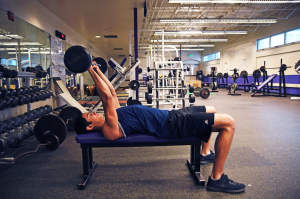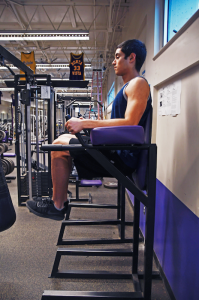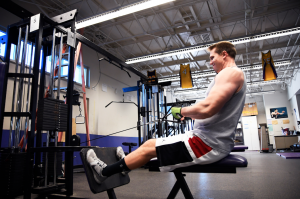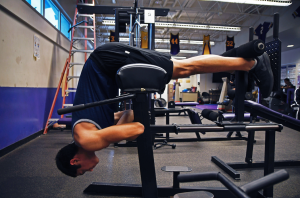One hundred and 40 pounds. That’s how much senior Steven Ataee weighed his freshman year. As a member of the MVHS football team, he trained extensively to be on the offensive line, but struggled as he simply did not weigh enough. After the football season ended, he did some research online and decided to bulk. Three meals a day became five meals a day, 2,000 calories became 4,500 calories, and in a mere six months Ataee gained 50 pounds.

Bulking is the common term used to describe the process of an individual trying to undergo muscular hypertrophy. The process involves increasing protein and calorie intake partnered with lifting weights. The ultimate goal is to add more muscle mass and spark muscle growth. In contrast to bulking is cutting, a process by which caloric intake is limited and the body’s metabolism starts to burn through stores of glycogen in the body. For students however, athletic trainer and the MVHS health clerk Javier Margarito warns of issues with engaging in these activities.
“Can it be done safely — yes — but it’s on an individual basis,” Margarito said. “There’s a lot of things to consider as far as putting on muscle on a frame that’s still developing. It’s the main question or conundrum.”
An example of this health risk is Ataee himself. Ataee had some knee issues the summer leading into his sophomore year that were serious enough to require surgery. Although some of the added stress on his joints was due to football and bad form in the weight room, Ataee says that the added weight from the increased muscle mass was another contributing factor in his injury.
Back when Ataee first began bulking, it wasn’t as simple as just eating more food, because he had to force himself to continue eating even when he wasn’t hungry. He recounts how he didn’t approach bulking the right way his freshman year, as he would excessively eat unhealthy foods and feel nauseous, but force himself to hold it in. Ataee distinctly remembers staying up an extra hour on some days to complete his daily goal of eating 4,500 calories.

“I did it really bad,” Ataee said. “I’d stay up [an] extra hour for that terrible bulking smoothie, like high calorie, high carb, high protein, and I had to throw up but I wouldn’t because I always knew, ‘If you throw up Steven, you lose. You have to hold it in.’ I don’t think a lot of people knew, but I was really nauseous a lot of those times because I was forcing myself to chug down like so much volume again and again and again.”
After his first year of bulking, however, Ataee learned the proper way to bulk, which included developing an intense workout regime in order to build metabolism as well as an appetite. He also recommends eating higher volumes of healthier foods as one increases their overall calorie intake.
However, not all students bulk for athletic purposes. Some use it as a way to bulk up a lean frame. Senior Kashish Singal doesn’t like how he skinny he looks, but he has never quite managed to keep up with the process of muscular hypertrophy.
“I think the hardest thing is continuing with [bulking] because it gets really tiring,” Singal said. “Believe it or not, it gets tiring to eat a lot, mostly because you’re constantly forcing yourself to overeat. If it’s not food that you think tastes good, that’s problematic as well.”
According to Singal, he mostly bulks to become happier with the way he looks, but he also explains how being comfortable with the way one looks is also a must to succesfully bulk.
“I think an important thing to take away is that regardless of how you look, you should be comfortable with your body,” Singal said. “Even though I’m skinny, I’m pretty much fine with how I am. I know that I will look better if I’m bigger, but that’s not really something that’s very pressing for me. For anyone else who’s skinny out there or fat or whatever, they should be okay with their size and if they want to improve their size that’s great, but just be content in general.”
Although Margarito doesn’t feel qualified to make statements about consuming the excess amount of food people like Singal and Ataee associate with bulking, he does believe overeating may cause an issue for any student that tries bulking.
“That could be potentially an issue, because it’s also listening to their bodies,” Margarito said. “Because it’s like ‘Hey, if I’m not used to eating this amount of food and you’re trying to do it all of a sudden, your body can trigger a stress response where it’s going to have an adverse effect to what the end goal will end up being.”
He believes this stress response and the resulting flood of cortisol in the body will cause the body to create larger stores of fat and not the intended muscle mass.
Despite the discomfort and injuries, Ataee unequivocally stands by his decision to bulk. He says it made him a stronger athlete, and gave him the necessary motivation to strive for excellence.
However, guidance counselor Clay Stiver finds the concept of bulking to be questionable. He recalls his own high school experience, playing basketball and working out regularly, and how he ate an “insane” amount of food without any added attention to overeating.
 “I don’t ever think it’s really good to overdo things, everything [should be] in moderation, right?” Stiver said. “In my opinion, it doesn’t seem like a good idea to do that to your body, to try to gain weight really, really quickly or lose weight really really quickly. I just want people to be healthy and happy.”
“I don’t ever think it’s really good to overdo things, everything [should be] in moderation, right?” Stiver said. “In my opinion, it doesn’t seem like a good idea to do that to your body, to try to gain weight really, really quickly or lose weight really really quickly. I just want people to be healthy and happy.”
Ataee agrees that moderation is key, but unlike Stiver, he believes that bulking can be done moderately. He has faced his own struggles with finding that level of moderation, but after years of working out, he is content with his current regime.

“It was a good experience,” Ataee said. “It taught me a lot about how to eat healthier now, and although I made a lot of mistakes, I’m glad I did it. Because it got me where I wanted to be.”
Photos by Om Khandekar






